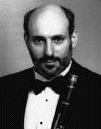 "How do you get to Carnegie Hall?" the bewildered tourist asks
the passing New Yorker. "Practice!" is the jaded reply.
"How do you get to Carnegie Hall?" the bewildered tourist asks
the passing New Yorker. "Practice!" is the jaded reply. David Ballon '79 did practice, and finally made it to center stage of the hallowed hall last February. His clarinet performance before a packed house at Carnegie Hall was rewarded with a standing ovation for the do-it-yourself concert.
David hired Weill Recital Hall--the chamber-music space at Carnegie--at his own expense, bought the mailing list, designed the ad, stuck on the postage labels himself, and sent the promotional mailer out to 4000 people. He hired a pianist and a string quartet, paying them for a full week of rehearsals before the performance of the program itself--Mozart, Brahms, Martino, and Penderecki--all out of his own pocket. His one-night stand set him back $10,000, but David cheerfully acknowledges that, for him, it was money well spent.
David has worked for the last 11 years with Institutional Investor, Inc., a multimillion dollar firm that develops corporate-strategy and money-management plans for bankers, financiers, and pension-fund directors, and is currently director of the Institute, a conference division of the firm.
Yet some unfulfilled part of the 43 year old still hankered for the career in music he had once assumed would be his natural path. An Oberlin double-degree student, he majored in clarinet and economics; played the Neilson Clarinet Concerts with the Oberlin Orchestra; won the conservatory's concerto competition; and made it into the highly competitive Tanglewood scholarship program two consecutive summers, playing under Leonard Bernstein, Gunther Schuller, and Luciano Berio.
That's when he began making the endless rounds for a chair with a reputable orchestra. Discouraged after some tantalizing near-misses, he reluctantly decided to put away his clarinet and move on to law school.
Before deciding to irrevocably change his professional course, he was impelled to give music just one more try. Maybe, if he practiced enough, he could win the prestigious Naumberg competition, and perhaps then easily land a chair with a really good orchestra. David quit his day job as a paralegal, and practiced relentlessly night and day for several months.
Did he win the Naumberg? No.
Traumatized, and close to what he calls "borderline nonfunctional," he didn't stir from his Upper West Side Manhattan apartment for weeks, morosely playing computer chess 14 hours a day.
A friend at Institutional Investor Institute phoned to offer him a weekend job helping with some computer-software problems in the accounting department. Within a year, David was a full-time employee.
Then, in 1993, without preamble, he experienced an urgent need to play again, and pulled his instrument out of the case where it had rested, undisturbed, for eight years. Doggedly practicing several hours each night and throughout every weekend for the next four years, he knew he was finally ready to be heard.
"Hello, Carnegie Hall?"
Would he do it again? In a heartbeat.
--MC